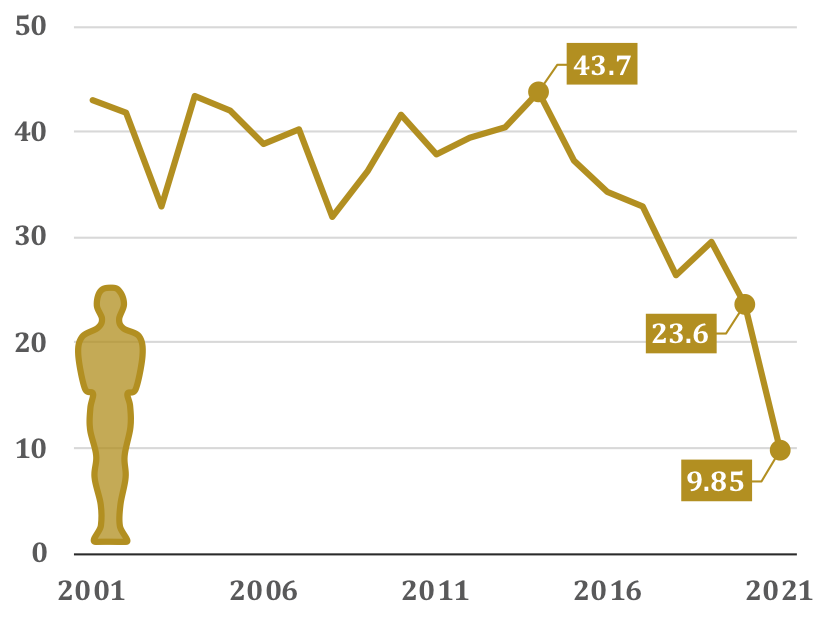Well, that was expected!
With the preliminary viewing figures available, it appears that Oscars 2021 was not a ratings success, pulling in an audience of 9.85 million viewers, the lowest in the show's history. The previous lowest was last year's, which still managed to draw 23.6 million.
Per Nielsen Live+Same Day preliminary national numbers, an average of 9.85 million viewers tuned in on Sunday evening to watch a more intimate and stripped-down version of the Oscars in the midst of a pandemic.
Mónica Marie Zorrilla, TV Ratings: Oscars Plummet to Record Low, Down 58% Compared to Last Year, Variety
It's fitting that a stripped-down show attracted stripped-down ratings, although it's unclear whether the viewership was any more intimate than in previous years. Nielsen doesn't collect that sort of data! Phnaar phnaar!
As to why the ratings have suffered so badly, that's anyone's guess. A dearth of compelling, theatrical releases during the pandemic; disinterest in pandemic show formats; preference for hosted ceremonies; growing realisation that many awards are rigged and meaningless; the decline of true celebrity in the social media age; fatigue over Hollywoke grandstanding and hypocrisy; others. Take your pick.
While it's tempting for those of us who're tired of being lectured by a privileged elite to apportion the blame there, it should be recognised that celebrity grandstanding has long been a thing. Admittedly, it has intensified more recently, as Hollywood transitioned to Hollywoke
. And the usual suspects
among YouTube and other online media outlets have been quick to assert the cause to be Hollywood's politicking and double-standards, like they're something new. But I'm not convinced.

Data from Wackypeedeeya.
Personally, while I'd like to believe that this year's plummet in the ratings represents a great awakening
, a rejection of Hollywoke's hypocrisy and political posturing—which may be true for the 2014–2020 period overall—I don't think that's the full explanation here. If the gradual decline in ratings over the past six years was extended to this year, the show would still have pulled in 20 million viewers. Instead, it achieved only half of that. The precipitous drop in awards ceremonies' ratings that has occurred across the board in 2021 is more likely due to the pandemic.
People get engaged in awards ceremonies when they have a direct interest in the outcome. With specific reference to the Oscars, theatrical releases were curtailed as cinemas were closed. Not only that, some of the contenders were released on streaming channels, which limits access to subscribers. With a lack of wide cinema releases during 2020 to excite the public, and give them something to root for, they're less likely to tune in to the Oscars.
Furthermore, people's lives have been put on hold for over a year. They've lost jobs, loved ones, hope; cinemas, restaurants, bars, and clubs are closed, and the ones that are open are not the same; freedoms are curtailed; gatherings are limited, if not banned; travel is restricted, with quarantine and testing putting a severe damper on holiday/vacation travel; businesses are being run into the ground; economies are being crucified, and we all know who'll pick up the tab eventually. It's not going to be Disney's bestie, President Pooh, whose economy is doing just dandy; due, in no small part, to the manufacture of Chongmasks to protect against his pestilential shithole of a nation's gift to the world.
Given all that, is it any wonder that people were unenthusiastic about seeing privileged pretenders passing out awards for doing their vastly overpaid day jobs? Why should anyone with an above room-temperature IQ, and a decent amount of self-respect, give a damn?
Pseudoscience stats stuff
The correlation coefficient is a measure of how closely two variables, in this case year and viewership, are related. It ranges between 1 (absolute positive correlation) and -1 (absolute negative correlation), where 0 means no relationship between the two.
Taking 2014 as the break point, the correlation coefficient between year and viewership during the period 2001–2014 is -0.0093, which is not statistically significantly different from zero (p=0.9749). This means that the chance of the two observations being unrelated is 97.5%. We can conclude that, overall, viewing figures did not change throughout this period, although they did fluctuate from year to year.
Between 2014 and 2020 there's a strong negative correlation of -0.9507, which is statistically significant (p=0.0010). What that p value means is that the chance that the two observations are not related to each other is only 0.1%. We can conclude that ratings have declined significantly year-on-year since 2014.
Disclaimer: Correlation analysis is more confident with more data. Correlation does not imply causation. The value of your investment may go down as well as up, and is not guaranteed. Usual disclaimers apply. Please move further down inside the bus.
The final ratings are now available, and the overall viewing figure for Oscars 2021 has been uprated to 10.4 million. This represents a drop of only
13.2 million (56%) from last year's previous low point.
So, good job all 'round. Well done, Steven Soderbergh and Team AMPAS! (slowhandclap)
But it wasn't all your fault, you can only work with the shit you're given!